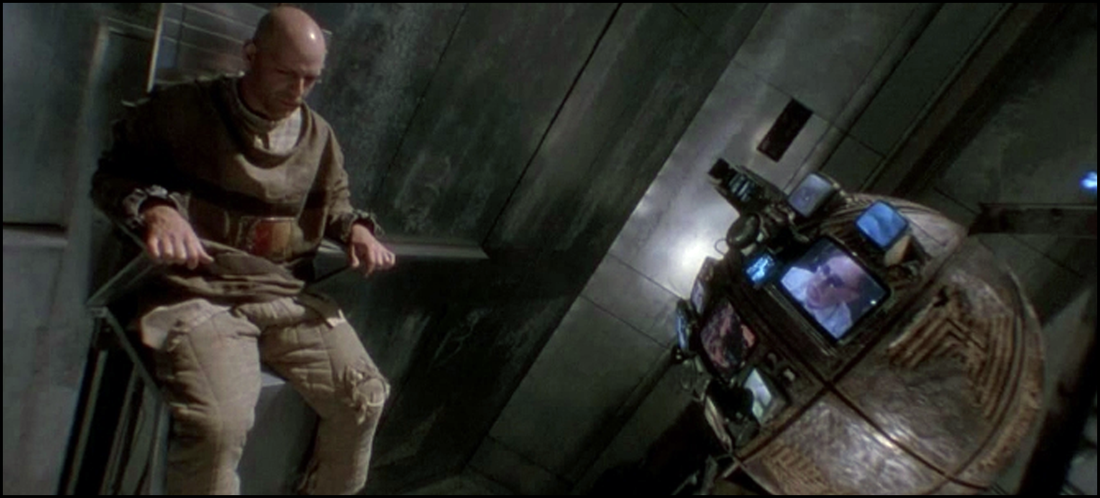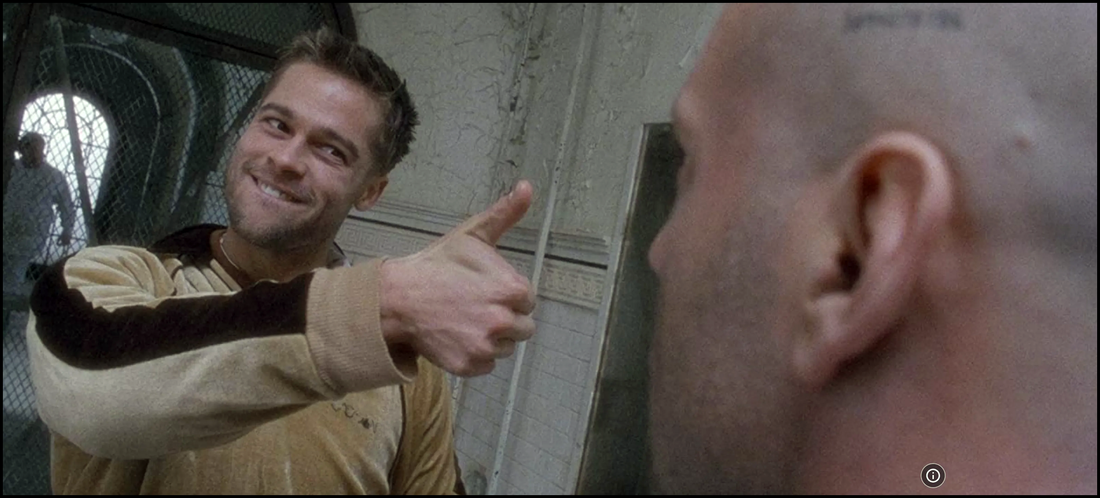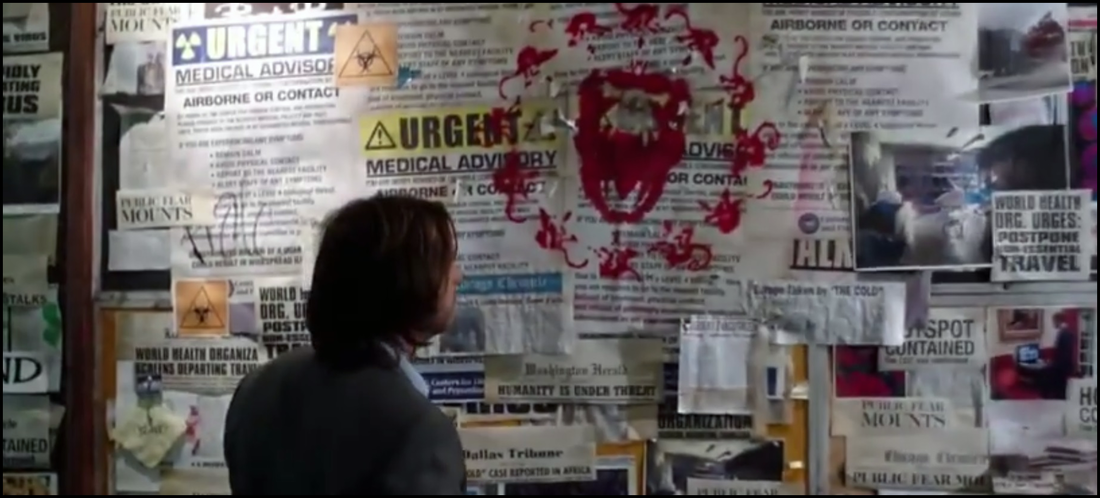Now, don’t get me wrong: I don’t dislike the man or his films. I’ve always qualified my position by confirming he’s a certified genius of a filmmaker. Everything he touches is visually exciting and filled with fabulous, interesting performances. It’s just that the stories he chooses to tell rarely interest me as a viewer. I’m not debating their merits, and I’m certainly not discounting their quality: it’s just that I don’t attach myself to them. A story that means nothing to me is a bit of a slog to watch, so I fail to connect on any emotional level.
This isn’t always the case. His early stuff – Monty Python And The Holy Grail (1975), Jabberwocky (1977), and especially Time Bandits (1981) – are classics in this household. As comedies, they’re still relatable, and his visuals collaborate with the themes in ways that reach out and touch the audiences. But sometime around Brazil (1985) the director turned his focus into more interpretative tales – yes, maybe even more cerebral – and I lost focus. In fact, I’ve tried to watch Brazil three times and fallen asleep every single one of them. At this rate, I’ll probably never see the end of it.
Call it haughtiness if you like but I’ve always believed that if the viewer can’t connect even in some small way to the story, then all the fancy visuals (and Gilliam’s films are lauded for their visuals) are just window dressing. It’s narrative trickery largely for the sake of narrative trickery, and that waters down the effectiveness of the storytelling. Doesn’t make it any less artistic, but a quilt made of the finest images known to man is still just a blanket when all is said and done.
Of course, I know I’m in the minority here. I don’t profess to be the first or last voice on the collected works of Terry Gilliam.
Still, it’s taken me some time to deeply appreciate what he accomplished with 12 Monkeys (1995).
As a long-time Science Fiction and Fantasy junkie, it’s a film I probably should’ve loved right out of the gate but didn’t. This twisted tale of time travel and Fate has so many levels to it that critics have long praised not only its construction and execution but also the feature is cited by many to be one of SciFi’s epic cinematic achievements. Today – twenty-six years after its release – I’m far more inclined to agree than disagree with those sentiments. I still have quibbles with it – small ones – but such is life.
So now that I’m in agreement with all the flick’s countless fans, let me tell you why I’m finally on their side.
From IMDB.com:
“In a future world devastated by disease, a convict is sent back in time to gather information about the man-made virus that wiped out most of the human population on the planet.”
Conflict is the beating heart of any story, and that’s one of the reasons I’ve struggled with 12 Monkeys over the years: its central conflict – that between James Cole (played by Bruce Willis), Kathryn Railly (Madeleine Stowe), and Jeffrey Goines (Brad Pitt) – never develops until late in the picture. In fact, the conflict that does evolve ends up being only circumstantially tied into the film’s true villain (David Morse in a small role), an Apocalypse radical whose hell bent on starting the End Times. The absence of a central conflict leaves the audience, instead, with a character study that’s predicated on watching these events unfold chronologically, a curious construct for a time travel picture. But given the fact that Cole is never depicted as ‘racing against time’ to stop the impending plague it’s clear that Monkeys was never about creating tension so much as it was drawing back the layers of its participants.
In that respect, Gilliam’s fable excels.
We meet Cole trapped in a prison cell, and he’s introduced as someone who may or may not have volunteered to work with scientists attempted to save the planet from certain doom. Though we’re never given much context for why he’s willing to risk his life for others, we do learn that some of his mania is fueled by a dream from his childhood, one where he witnessed a lesser tragedy unfold just before the world fell apart. Gilliam dissects that event as flashbacks spaced throughout the film, gradually increasing the information in tantalizing bits which grow familiar to viewers watching closely.
Similarly, Dr. Railly is introduced as little more than a pretty face in the crowd attending a lecture. Before we know it, she’s spirited away to meet Cole on his first trip back in time, where we learn that she’s a psychologist working with the police to help the battered and the bruised overcome their various psychoses. Unlike her colleagues, Railly is eventually shown to care for her patients beyond what is normal; and this is the first sign we’re given that our protagonist has truly found someone who cares for his wellbeing, even if it’s initially only on a professional level.
This character-driven polar shift is the heart of 12 Monkeys, and it always will be. Where conflict fuels most conventional dramas, Gilliam turns this cautionary tale over to its players. Time travel – a construct that remains front-and-center throughout – is only a construct here to explore people, not so much the events in which they participate. Sure, the director packs the picture with all of his signatory visual bells and whistles; but the true core of the film remains the work by Willis and Stowe, both exceptional in their performances respectively.
Much has been written about Brad Pitt’s character in the film as well. Jeffrey Goines is the tried-and-true ‘crazy person’ of the script, but – for what it’s worth – I found his creation a bit too formulaic here. Pitt turns in a great performance, though the character – a wackier-than-thou rich kid with daddy issues and probably a chemical dependency – is more than a bit of a cliché here. He’s ‘the Joker’ to Willis’s ‘Batman,’ and as Fate would have it Goines winds up being little more than a distraction in the big climax.
Still … who knows? Perhaps that’s the point 12 Monkeys makes all along?
Perhaps history can’t be changed. Perhaps Fate is, somewhere, written in stone. Perhaps the best intentions of all involved can’t ever truly save a sinking ship, and instead we’re left with trying to eek out what moments of goodness, grace, and mercy we can along the way while we’re waiting for the big sleep, that inevitable nap in the dirt awaiting us all? Perhaps we’re always chasing our tail, and even though we’ve caught it we’re forever destined to keep running?
Where’s the future in that?
Highest recommendation possible. Look, even the best film ever made is likely to have some narrative drawbacks, and – in my humble estimation – 12 Monkeys doesn’t avoid a few creative missteps, namely the introduction of elements that do question the sanity of its characters in moments wherein we’re already certain time has been breached, mistakes were made, and tragedies cannot be averted. The difference between my impression of it from over two decades ago to today is that I’ve decided to embrace those faults and – like James Cole and Dr. Railly – live with that epiphany. Sure, it’s imperfect … but so is life. Gilliam’s produced a brilliant film worthy of endless discussion, and our genre is richer thanks to his contribution.
In the interests of fairness, I’m pleased to disclose that the fine folks at Arrow Video provided me with a complimentary Blu-ray of 12 Monkeys (1995) by request for the expressed purposes of completing this review; and their contribution to me in no way, shape, or form influenced my opinion of it.
-- EZ





 RSS Feed
RSS Feed